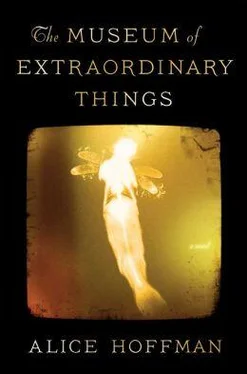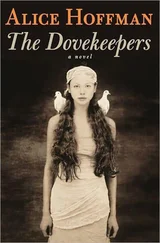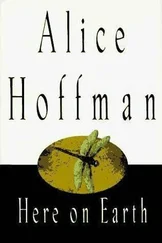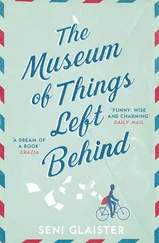Coralie knew her father was in desperate need of an exhibit that would compete with Dreamland and Luna Park and the other grand amusements in Coney Island. Two years earlier the famous Sigmund Freud had come to Brooklyn, to try to understand the American point of view; among the few things that were said to have impressed him were the magnificent amusement parks. Imagination was all in Brooklyn, and this was what Sardie had to sell; it was his gift, one he thanked his maker for each and every day. He always insisted that his establishment was not a freak show, like the well-known Huber’s Dime Museum on Fourteenth Street in Manhattan, which had been a purveyor of the strange and unique for many years until finis was posted on its door in 1910, or the dozens of dreadful little entertainments that lined lower Surf Avenue, exhibitions that debased and degraded their human skeletons and amputees, their conjoined twins and the men who allowed fleas to suck the blood from their bodies, along with the wrestling rings and vaudeville halls, the worst and most exploitive of them having moved northward, to an area known as the Gut. The Museum of Extraordinary Things was a true museum, a place of edification, wherein natural curiosities were displayed along with human marvels. Now, however, they needed more, and, when more could not be found, it must be invented. If there was anyone who might be able to succeed in such an act of trickery, it was the Professor, who had been a magician in France, quite famous in his time, known for acts of wonder so astounding they had made people doubt their own eyes. He understood that not only could a man’s eyes mislead him but his mind could deceive him as well.
Coralie followed her father’s instructions, as she had all her life, though her heart sank at the nature of her obligation, a trick to be played upon all of New York. The headlines called her the Hudson Mystery, for no one had managed to spy her features. Two fellows in a canoe had caught sight of her tonight as she’d raced past so these witnesses wouldn’t be able to make out her womanly form. Instead they saw only what they imagined, exactly as the Professor had predicted, and men’s imaginings were dark in these dark times. It was a season of great and terrible clashes in the streets, of bosses and politicians and police pitting themselves against working men and women. Debates became free-for-alls, with arrests of workers wanting nothing more than their fair share. The gap between the immigrant populations relegated to the overcrowded tenements of the Lower East Side and those who lived in brownstone mansions surrounding Madison Park had created a tinderbox of hatred.
And yet despite the news of labor troubles—strikes of ship workers on the docks of Brooklyn and garment workers in Manhattan gathering in near riots—there was always a story in the Sun and in the Times on the day following a swim, for the Hudson Mystery had caught their readers’ attention. The creature of the deep had become a riddle discussed on street corners and in shops. In the morning, the eighteenth news story would appear, a fortuitous number, as it was Coralie’s age, her birthday having been celebrated two days earlier with a ginger-apple cake Maureen had baked, rich with sugar icing and dotted with candles that sparked when Coralie tried to blow them out.

Once she’d left the river, Coralie walked through the newly unfolding swamp cabbages and fiddlehead ferns that grew in wild profusion in the boggy woods. Freedom was a treasure, even for a scant few hours. The chance to become a heedless wraith wandering through the chill landscape was a gift. No one could command her here. She might easily be a water nymph who had clambered onto the shore of a new and tender land. The world looked aglow, as if a door had opened and there, on the other side, was a vivid haze. She imagined it was the future that awaited, the unexpected life she might lay claim to if she never again returned home. Shadows threaded through the locust trees. The night’s dark color washed over the landscape in a mist of blue. She removed the mask she wore to make her seem inhuman, one fashioned by the same woodworker who made the museum signs.
Coralie gazed across the river at a shore she did not recognize, unaware that the white cliffs shining in the dark were called the Palisades. She was not far from the last wild land to the north, but she had no idea of where north was, as she had no idea that the Bronx itself was being remade after the building of the Grand Concourse, modeled on Paris’s Champs-Élysées. Monsters did not carry maps, and when they were lost they had no recourse but to rely on human kindness. Coralie peered through the thickets before her. In secluded patches of Manhattan that had once belonged to the original Dutch landowners, the acreage was still overgrown with ancient stands of hickory, chestnut trees, and black-green elms. Through the shadows, she caught sight of a curl of smoke rising into the dark. She followed it as if it were a beacon, hoping for a hot cup of coffee and a blanket to throw around her shivering body.
Her clothes clung to her as she went on; but even when she was weighed down by her sopping trousers and shirt, she had a swimmer’s easy gait. She swiftly made her way up the slippery bank. Brambles clung to her, but she managed to untangle herself from the stickers. The silence of the night was intoxicating. There were no crickets yet, for the season was still too cold, no peepers, and no birds sang at night. The swamp cabbage that was everywhere had a pungent stink, green and sharp. Just then a dog barked, the sound echoing. All at once Coralie had a rush of panic. What had she been thinking to look for company? What questions might be asked of a young woman swimming in the river in this harsh season? And who was to say there were not criminals camping in these woods, homeless men who would think nothing of attacking her?
Coralie crouched down and narrowed her eyes, peering past the shadows. Through the locust trees she spied the form of a young man at a bonfire, fixing a late supper over the flames. She darted behind the nearly heart-shaped leaves of a linden tree, the better to see who she had come upon. She thought of Whitman. Stranger! if you, passing, meet me, and desire to speak to me, why should you not speak to me? And why should I not speak to you? And yet, as she watched this stranger, she was mute. He was dark, with handsome features, rangy and more than six feet tall. He was sunburnt from his day at the river, and he whistled to himself as he cleaned the fish he’d caught. Something about him moved Coralie in a way she didn’t understand, an almost magnetic pull. She felt alarmed by the thrum of her own pulse. The dog beside the young man was the sort used for fighting. It spied her in the woods and began to bark in earnest.
“Quiet, Mitts,” she heard the man say.
The pit bull terrier looked at his master and considered, but was clearly too high-spirited to obey. The creature bounded into the woods, in her direction. The man let out a shout, but the dog continued on.
Coralie took off running, her breath coming in bursts. She felt a sharp pain below her breastbone as her heart thudded against her ribs. Her father had kept her separate from the public, except for those hours when she was on exhibit. He believed that living wonders could be made common by their association with outsiders, who could not possibly understand them and would most likely take advantage of them and ruin them. “Once you are ruined,” her father had warned, “there’s no way back.”
The dog crashed through the underbrush. Coralie could hear him racing behind her. She did her best to outpace him as she tore through the brambles, but in no time the creature was at her heels. She turned, afraid she might be attacked from behind. Her blood felt hot within her chilled flesh as she steeled herself, ready to be bitten. She knew how red her blood was, how on fire despite how waterlogged she was. The pit bull’s ears and tail were cut to nubs, and he had a compact, muscular body. Coralie expected him to leap at her, foaming at the mouth; instead he wagged his rear end and gazed up at her, utterly foolish and friendly. This was no vicious beast, only man’s best friend.
Читать дальше













